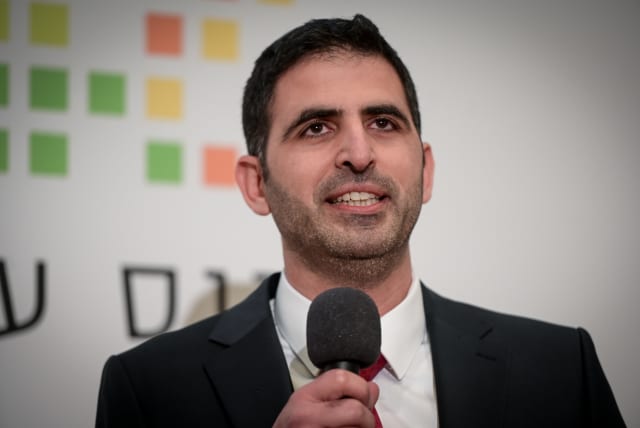Communications Min. unveils plan to change media field in Israel

Content providers will be required to deliver the content of registered news providers.
Communications Minister Shlomo Karhi presented a new broadcasting bill on Monday, which includes a series of changes in the field of communication and its regulatory authority.
Regarding the structure of the regulator and its authorities, it is stated in the document that there will be one body with minimal powers that will serve as an independent authority without intervention in content.
The council will consist of nine members - three government officials, a chairman, and five public representatives.
Two of the public representatives will be directly appointed by the communications minister, and the others will be appointed by a committee composed of representatives from three ministries: Communications, Education, and Justice.
Additionally, three government officials will be nominated by other ministers, and a separate identification committee will be established for the position of chairman, subject to government approval.
Another topic that arises is the issue of licenses for news broadcasts - the current requirement will be canceled, and it will be replaced by a transition to a registry of news providers.
Simultaneously, the regulator will not interfere in broadcast schedules or financial investment obligations. The new regulation is expected to generate competition, diversify players, and increase variety.
Public will have control which content they went to watch
Furthermore, there will no longer be a mandatory establishment of a separate news company, and the regulator's involvement in the content will be abolished. Instead, the public will have control and be able to choose which content they want to watch.
Another change is related to the issue of cross-ownership of media outlets, which currently prohibits all players in the news industry from competing in television as well. The new model proposed by Karahi stipulates three levels of cross-ownership in a traffic light model.
The "Green Level" defaults to quick and straightforward approval. The "Yellow Level" allows holders of news websites or newspapers to broadcast radio programs based on market analysis. Control of another news provider will require the council's approval after considering competition and dispersal in the news sector. The "Red Level" states that those who hold news websites and newspapers, whose main activity is publishing and party-lobbying, will be prohibited from obtaining a license.
The document also refers to the issue of providers in the competitive market. Now there will be a unified provider that will offer for free to all other registered content providers the content from the channel where its news are provided. The provider will also distribute free content from any news provider that is a "free reception" channel.
Regarding sport broadcasts, the minister suggests a series of criteria for a list of events that will have to be broadcasted on the channel available to everyone. At the same time, the exclusivity of sports channels will be prohibited, and all the channels will have to supply different content at non-discriminatory prices and will also have to enable watching sports through apps.
The new regulation will apply to Partner and Celcom as well, basic packages will be cancelledd to allow the user free choice. There will also be an added option for commercials. The new bill also requires investment in original productions with an emphasis in documentries and drama.
Content providers will be required to invest according to their size: Medium local or international content providers will invest two percent of their budgets, large local and international providers will invest four percent, Israeli channels registered as a medium will invest six percentt, and larger channels will invest 12%.
Registered medium or large local content providers that are not international and Israeli channels with significant activity will be required to invest an additional 15% of the budget in certification programs or content for children, youth, or early childhood.
Alongside this, there will be flexibility when it comes to buying external productions.
Flexibility in purchasing external productions
Idan+ service will move to an app, saving the public about NIS 40 million a year, along with reducing subscription costs and the obligation to provide free reception of channels with a minimum threshold, where anyone interested will only pay operational costs. The continuation of their service will be re-evaluated in about five years.
Another topic addressed in the document is the accessibility of VOD content to the public without cost on all platforms, along with the accessibility of archive content at operational costs only.
Additional issues mentioned in the document specify that providers will not be able to provide remote controls that have been adapted and only neutral controls will be allowed.
"Minister Karhi's plan is another stage in a move that includes destroying the free media in Israel," said Kan and N12 in a joint statement. "Implementing the plan, which includes governmental regulation and censoring of the news like they do in dictatorships, will severely harm Israel democracy and freedom of speech and journalism in Israel."
Jerusalem Post Store
`; document.getElementById("linkPremium").innerHTML = cont; var divWithLink = document.getElementById("premium-link"); if (divWithLink !== null && divWithLink !== 'undefined') { divWithLink.style.border = "solid 1px #cb0f3e"; divWithLink.style.textAlign = "center"; divWithLink.style.marginBottom = "15px"; divWithLink.style.marginTop = "15px"; divWithLink.style.width = "100%"; divWithLink.style.backgroundColor = "#122952"; divWithLink.style.color = "#ffffff"; divWithLink.style.lineHeight = "1.5"; } } (function (v, i) { });

